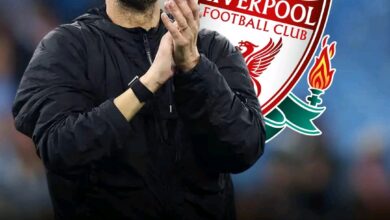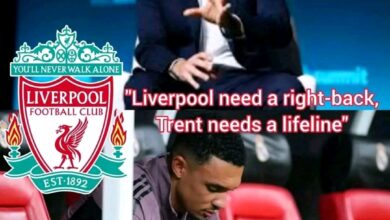Iconic Liverpool coach went ‘mad’ at star player after he showed his true colors

Football has always been a game of passion, competition, and those moments that blur the line between right and wrong. It is a sport where players are driven to do anything to win, and sometimes that means bending the rules, testing boundaries, or in some cases, openly admitting to something that might shock the ordinary fan. This is exactly what came to light when former Liverpool defender Jamie Carragher sat down to share stories from his career during an episode of The Overlap Fan Debate*, brought to fans by Sky Bet.
Carragher, never one to shy away from honesty, admitted something that raised eyebrows. He called himself a “cheat” on the pitch, though not in the malicious way some might immediately imagine. For him, it was about the relentless desire to win, the obsession to get every advantage possible, the refusal to accept defeat without scratching, clawing, and fighting for every inch. His words opened a wider conversation about how much of football depends on these grey areas of morality, where the hunger for victory sometimes overshadows ideals of fair play.
But Carragher did not stop there. In explaining his point, he recalled a fascinating story from his time at Liverpool, one that involved two other iconic figures of the club: Robbie Fowler, the striker who earned the nickname “God” from the Kop, and Ronnie Moran, the legendary no-nonsense coach who was a cornerstone of the Boot Room era. The story, as Carragher told it, highlighted how even in the ruthless world of football, honesty could sometimes shine through — though not without consequences.
The incident took place during a game where Liverpool were awarded a penalty. Most strikers would have grabbed the ball, placed it on the spot, and buried it in the net without a second thought. After all, penalties are golden opportunities. But Robbie Fowler, true to his character, decided otherwise. He told the referee that the decision was wrong, that he had not been fouled in the way it seemed, and that the penalty should not stand.
It was a moment of rare honesty in the game, the kind of act that earns admiration from fans and commentators. But not everyone saw it that way. Ronnie Moran, the hard-edged coach who had spent decades drilling into players the importance of winning at all costs, was furious. As Carragher remembered it, Moran gave Fowler a stern telling-off afterwards. To him, it was not about gestures of honesty or morality. It was about results, about doing everything in your power to secure victory for Liverpool Football Club.
This clash of perspectives — Fowler’s integrity versus Moran’s uncompromising demand for victory — paints a vivid picture of the culture at Liverpool during those years. It was a club built on discipline, toughness, and the expectation that players would sacrifice anything to win. But it was also a place where unique characters like Fowler could still show flashes of individuality, moments that revealed footballers are not machines, but human beings making split-second choices in the heat of the game.
Carragher’s decision to tell this story now, years after retiring, gives fans an insight into the realities of football culture that often stay hidden. On the outside, supporters see the goals, the tackles, the celebrations, and the trophies. But inside the dressing room and on the training pitch, there is a constant push and pull between ideals and realities, between fair play and the obsession with winning.
For Carragher, calling himself a “cheat” was less about shame and more about honesty. He admitted that he, like countless others, did what it took to tilt the odds in his favour. That might mean appealing for a throw-in he knew was not his, exaggerating contact to win a free-kick, or nudging the ball forward at a set-piece when the referee’s eyes were elsewhere. Small acts, perhaps, but they add up. And Carragher argued that every professional footballer, no matter how noble they appear, has engaged in similar behaviour
It is here that the Robbie Fowler story becomes so powerful. In a world where bending the rules is commonplace, Fowler chose a different path that day. But instead of being celebrated within the team for his honesty, he was scolded. Ronnie Moran’s furious reaction was a reminder of the values he believed mattered most. To him, football was not a place for gestures. It was war, and in war, you use every weapon you have.
The fans, of course, loved Fowler for it. To them, it was proof that Liverpool still had players with integrity, players who valued fairness even in the heat of competition. Fowler’s reputation as a humble, grounded lad from Toxteth only grew stronger. But to the likes of Ronnie Moran, this was a dangerous path. If one player started giving up advantages, what message did that send to the rest of the team?
Carragher, sitting in the middle of these two figures during his career, absorbed the lesson. He admitted that he leaned more towards Moran’s view, not because he lacked honesty, but because his obsession with winning was too strong. He wanted to be victorious, to deliver for the supporters, to stand tall at the end of every battle. For him, like so many others, the line between fair play and bending the rules was one he was willing to cross.
This is what makes football so compelling. It is not just a game of tactics and skills; it is a game of morality, of choices made in split seconds, of players deciding whether to take advantage or to step back. And those choices shape not only the outcomes of matches but also the legacies of the players themselves.
When Carragher looks back now, he does not regret his own actions. He sees them as part of the game, part of the fight that made him who he was: a defender who gave everything for Liverpool, who would bleed for the shirt, who would never accept defeat lightly. But he also acknowledges Fowler’s act as something special, something rare, something that still resonates decades later.
And then there is Ronnie Moran. His presence looms large over the story because he represented the old-school Liverpool mentality, the one forged in the Boot Room, the one that turned the club into serial winners. His telling-off of Fowler was not personal; it was cultural. It was his way of ensuring that no player forgot the ultimate priority: winning. For Moran, the name on the scoreboard mattered more than the headlines in the paper.
The beauty of Carragher sharing this story now is that it shows all three sides: Fowler’s honesty, Moran’s ruthlessness, and his own willingness to admit he was not perfect. It shows that football is not black and white, but filled with shades of grey. And it leaves fans with a question to ponder: would you want your player to be like Fowler, giving up a penalty to be honest, or like Moran and Carragher, willing to take every edge to secure victory?
The answer may depend on who you are. Supporters often dream of integrity and romance, but when the stakes are high — a title, a trophy, a derby — many of those same supporters might quietly hope for the ruthless edge. That is the contradiction at the heart of football.
Carragher’s honesty in admitting to being a “cheat” makes him relatable. It breaks the myth that players are saints on the pitch. It also reinforces the idea that football is a reflection of life: full of competition, compromise, and choices that are not always perfect. Fowler’s moment of honesty may have cost Liverpool an easier path in that game, but it gave fans a story they would cherish forever. Moran’s anger may seem harsh, but it came from the same place as Carragher’s cheating — a burning love for Liverpool and a refusal to let anything get in the way of victory.
As the conversation in *The Overlap* moved forward, fans were left smiling, debating, and reflecting. Carragher had once again managed to bring the game to life, telling a story that captured not just the details of a match, but the essence of football itself: the struggle between honour and hunger, between playing fair and playing to win.
And so, decades later, the image remains clear. Fowler, standing on the pitch, waving off the penalty, pointing out to the referee that the decision was wrong. Ronnie Moran, furious in the dressing room, demanding answers. Carragher, watching and learning, realising that football was about far more than just kicking a ball — it was about choices that define who you are as a player, and as a person. That is why stories like this matter. They remind us that football is not a perfect game. It is messy, human, complicated. And that is exactly why we love it.















